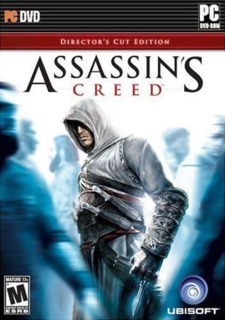Functional, but not desirable
A Review by Chris Camz of UnfashionablyLateReviews.blogspot.com
I have had a vested interest in the Assassin's Creed franchise since its launch back in 2007, and even more so now that it has become one of Ubisofts's most successful titles. Now that the 4th game in the series has been released, I have just finished the first, and am overwhelmed with a feeling of mediocrity. Not to say that the game is bad, far from it actually. However, my unprofessional opinion of it is that there is simply too much "fluff."
The most commonly held misconception about the game is that Altair is the protagonist of the story, which would make sense as about 90% of the game is played in his turn-of-the-century world in which we watch the war between the Crusaders and the Saracens unfold, but this is actually nothing more than a memory. The real protagonist of the series is Desmond Miles, a man in the not-too-distant future, who has been kidnapped by a certain pharmaceutical company and is being more or less forced to relive the memories of Altair in the most stressful work quarter of his career. Mr. Miles's captors are searching for something in Altair's lifespan, which is not revealed until the end of the game. This means that, on the one hand, the game makes very, very little sense in the first half. On the other hand however, it is an extremely immersive experience when you take control of Desmond. As previously stated, however, Desmond is only playable for roughly 10% of the game's entirety, and the memory sequences through Altair can be very confusing unless you take notes and are unusually good at remembering names. I discovered I would not make a very good assassin by playing this game for two reasons; number one: I have a terrible memory when it comes to people I meet only once and number two: my legs lack the ability to regrow when failing to jump between buildings.
The game was one of the first to really put a premium on parkour, as it launched beside the first Uncharted, which also integrated platforming on a smaller scale. If you take the time to look back at my Uncharted Review, you would see that I did not enjoy these sections in Uncharted either. I think I was a lot more forgiving of Uncharted, though, mostly because the game only makes me climb walls and jump ledges outside of combat, and only in small doses. Assassin's Creed force-feeds the free-running element to me on a constant basis. I was also more forgiving with Uncharted because it didn't suck nearly as badly. AC makes me hold the left bumper to jog, and hold the bumper and X (or A for those on Xbox.) This even sounds pretty funky on paper, so there must have been a considerable amount of glue huffed at Ubisoft. Supposedly, the result was supposed to be a free-flowing experience in which you merely had to control Altair's direction. The outcome, however, involved a considerable amount of fail, and I have the shattered limbs to prove it. The horrible mechanic parade may have just been a problem for the first in each series, however, and both of these games released sequels in 2009 alongside InFamous. which was phenomenal at platforming, so hopefully both Uncharted and Assassin's Creed cleaned up their acts for their sophomore titles. What differentiates Uncharted and Assassin's Creed in this category, however, is that the world in Assassin's Creed is much more sprawling and open than it is in the Uncharted series. This means that I can explore an entire city in my own time if I wanted to, while in Uncharted Nathan moves in a linear fashion through a cave, dungeon, or fort with a direct goal in sight. While this doesn't make the importance of good controls or an intuitive system any less crucial, it means that the whole free-running systems simply fits more comfortably within the world of Assassin's Creed than it does in Uncharted. I suppose if I was a more dedicated player and critic, I would make full use of the surroundings to complete these assassinations, but the "charge headfirst at the target and stab anything that walks on two legs" tactic worked so much better and was a lot more fun anyway, so I never felt motivated to be creative. Either that or I just have no imagination, but I think everyone knew that one already.
The story of Altair was fairly boring, as I was forced to complete the same two or three mini-games before I was given the opportunity to stab another person in the neck, but the story really heats up after the final assassination (the readers paying attention here would also have picked up that this also means that the game practically dragged itself through the first half) and carried seamlessly from one location to the next without hitting a snag. As stated before, the parts playing as Desmond were much more interesting, and carry an undertone of being isolated amidst a great struggle. You are given tidbits of information about how people are searching for him, and these people even break into the facility to try to save him, but you are so cut off, you don't even get to see what is going on. You can just feel that there is so much happening all around you, but that you are somehow being shielded from it. It is difficult to explain, but suffice to say, it left me extremely excited to play the next game, which just so happens sitting in my closet right now. Expect a full review of Assassin's Creed 2 and the second half of Battlefield 3's review soon.
Gameplay…8
Sound…6
Graphics…7
Replayability…6
Story…8
Average…7

